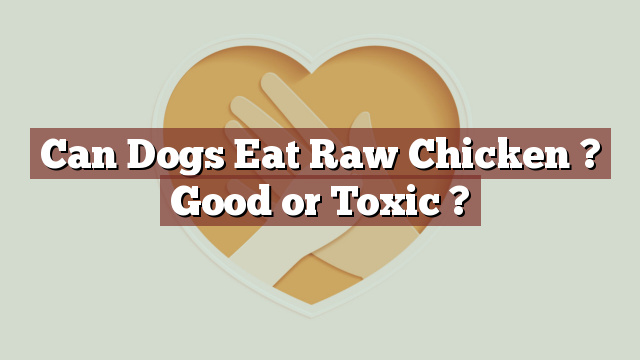Can Dogs Eat Raw Chicken? Good or Toxic?
Feeding our furry friends with the right food is crucial for their overall health and well-being. As responsible pet owners, it’s important to be aware of what is safe for our dogs to eat and what should be avoided. One common question that arises is whether dogs can safely consume raw chicken. In this article, we will explore the nutritional value of raw chicken for dogs, discuss its safety, potential risks and benefits, and provide guidance on what to do if your dog eats raw chicken.
Nutritional Value of Raw Chicken for Dogs
Raw chicken is a good source of protein for dogs. It contains essential amino acids that help maintain muscle mass and support growth and development. Additionally, chicken is rich in vitamins such as B6 and B12, which play a vital role in energy metabolism. It also provides minerals like zinc and iron, which are important for a healthy immune system and oxygen transport in the body. Overall, raw chicken offers a well-rounded nutritional profile that can benefit our canine companions.
Is Raw Chicken Safe or Toxic for Dogs?
Raw chicken can pose potential risks to dogs and should be handled with caution. While dogs are naturally equipped to handle certain bacteria found in raw meat, there is still a risk of bacterial contamination, including Salmonella and Campylobacter. These bacteria can cause gastrointestinal upset, diarrhea, and in severe cases, lead to more serious health issues. Therefore, it is generally recommended to avoid feeding raw chicken to dogs to minimize the risk of foodborne illnesses.
Potential Risks and Benefits of Feeding Dogs Raw Chicken
Feeding dogs raw chicken may have some benefits, but it is important to weigh them against the potential risks. Proponents of raw feeding argue that it can improve digestion, boost energy levels, and promote healthier skin and coat. However, these claims are mostly anecdotal, and scientific evidence supporting these benefits is limited. On the other hand, the risks associated with bacterial contamination and the potential for nutritional imbalances make feeding raw chicken a questionable choice for most dog owners.
What to Do if Your Dog Eats Raw Chicken
If your dog accidentally consumes raw chicken, it is important to monitor their behavior and health closely. If your dog shows any signs of gastrointestinal distress such as vomiting, diarrhea, or loss of appetite, it is recommended to consult your veterinarian immediately. Your vet may conduct tests to rule out any potential infections and provide appropriate treatment if necessary. It’s always better to be safe and seek professional advice when it comes to your pet’s health.
Conclusion: Considerations for Feeding Dogs Raw Chicken
In conclusion, while raw chicken can provide some nutritional benefits, the potential risks outweigh the advantages. Dogs can be susceptible to bacterial contamination from raw chicken, which can lead to foodborne illnesses. It is best to opt for cooked chicken as an alternative, ensuring it is properly prepared and boneless. This way, you can provide your dog with a safe and balanced diet while minimizing the risk of harmful bacteria. Remember, consulting with your veterinarian about your dog’s specific dietary needs is always a wise decision to ensure their optimal health and happiness.
Thank you for investing your time in exploring [page_title] on Can-Eat.org. Our goal is to provide readers like you with thorough and reliable information about various dietary topics. Each article, including [page_title], stems from diligent research and a passion for understanding the nuances of our food choices. We believe that knowledge is a vital step towards making informed and healthy decisions. However, while "[page_title]" sheds light on its specific topic, it's crucial to remember that everyone's body reacts differently to foods and dietary changes. What might be beneficial for one person could have different effects on another. Before you consider integrating suggestions or insights from "[page_title]" into your diet, it's always wise to consult with a nutritionist or healthcare professional. Their specialized knowledge ensures that you're making choices best suited to your individual health needs. As you navigate [page_title], be mindful of potential allergies, intolerances, or unique dietary requirements you may have. No singular article can capture the vast diversity of human health, and individualized guidance is invaluable. The content provided in [page_title] serves as a general guide. It is not, by any means, a substitute for personalized medical or nutritional advice. Your health should always be the top priority, and professional guidance is the best path forward. In your journey towards a balanced and nutritious lifestyle, we hope that [page_title] serves as a helpful stepping stone. Remember, informed decisions lead to healthier outcomes. Thank you for trusting Can-Eat.org. Continue exploring, learning, and prioritizing your health. Cheers to a well-informed and healthier future!

